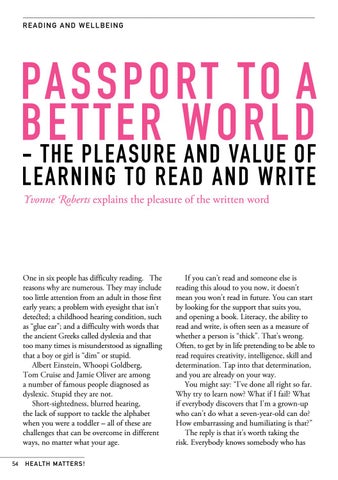READING AND WELLBEING
PASSPORT TO A BETTER WORLD - THE PLEASURE AND VALUE OF LEARNING TO READ AND WRITE Yvonne Roberts explains the pleasure of the written word
One in six people has difficulty reading. The reasons why are numerous. They may include too little attention from an adult in those first early years; a problem with eyesight that isn’t detected; a childhood hearing condition, such as “glue ear”; and a difficulty with words that the ancient Greeks called dyslexia and that too many times is misunderstood as signalling that a boy or girl is “dim” or stupid. Albert Einstein, Whoopi Goldberg, Tom Cruise and Jamie Oliver are among a number of famous people diagnosed as dyslexic. Stupid they are not. Short-sightedness, blurred hearing, the lack of support to tackle the alphabet when you were a toddler – all of these are challenges that can be overcome in different ways, no matter what your age. 54
H E A LT H M AT T E R S !
If you can’t read and someone else is reading this aloud to you now, it doesn’t mean you won’t read in future. You can start by looking for the support that suits you, and opening a book. Literacy, the ability to read and write, is often seen as a measure of whether a person is “thick”. That’s wrong. Often, to get by in life pretending to be able to read requires creativity, intelligence, skill and determination. Tap into that determination, and you are already on your way. You might say: “I’ve done all right so far. Why try to learn now? What if I fail? What if everybody discovers that I’m a grown-up who can’t do what a seven-year-old can do? How embarrassing and humiliating is that?” The reply is that it’s worth taking the risk. Everybody knows somebody who has















